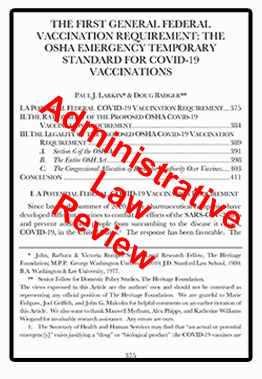By Paul Larkin, Jr., and Doug Badger |
The Heritage Foundation, December 2021 |
Legal and policy experts Paul Larkin and Doug Badger argue in a paper for The Heritage Foundation that the Occupational Safety and Health Administration (OSHA) lacks the authority from Congress to issue a general vaccine mandate.
The U.S. Supreme Court will hear arguments on Friday regarding a regulation issued by OSHA involving the mandate. Plaintiffs are asking the Supreme Court to stay implementation of the mandate. Unless the court acts, OSHA intends to begin enforcing most of the regulation’s requirements next Monday.
The case represents a significant test of the federal government’s authority over private businesses and individual citizens.
Larkin and Badger argue:
- OSHA lacks any authority to issue a general vaccine mandate on Americans. “OSHA is a workplace safety agency, not a public health agency,” they write.
- OSHA pushed the vaccine mandate without gathering data on how such a mandate would impact the economy, likely overstating the mandate’s benefits and understating its costs in order to push the administration’s vaccine agenda.
- At a time when U.S. labor force participation is declining, OSHA’s general vaccine mandate will only worsen the nation’s acute labor shortage, the supply chain crisis, and the emergence of inflation.
There are huge constitutional, medical, and economic consequences of imposition of a federal vaccine mandate, and the agency does not have the authority or the ability to accurately estimate the implications, Larkin and Badger argue. For example, “OSHA has not accounted for any of the potential costs associated with the legal and medical judgments that employers will confront when complying with the [mandate], particularly if those judgments do not align with those of federal regulators.”
Nor does it estimate the potential costs on workers, including the expenses associated with vaccine-related adverse reactions and the costs of weekly COVID-19 tests, they write.
On November 5, 2021, OSHA promulgated a rule directing companies with 100 or more workers to require their employees to be vaccinated or wear masks and undergo weekly COVID-19 tests. Most of the regulation’s requirements, including those mandating that companies collect and maintain records of each employee’s vaccination status, were to have taken effect on December 6. In light of ongoing litigation, OSHA has delayed enforcement of those provisions until January 10. The requirements that unvaccinated employees test weekly has been postponed until February 9.
“The Constitution empowers Congress alone with the power to legislate, which entails consideration by elected representatives of the mandate’s constitutional, public health, economic, and other implications. Congress has not legislated a general vaccine mandate. OSHA cannot speak where Congress has remained silent,” they argue.
From the constitutional to the medical, the economic to the epidemiological, from the theoretical to the practical, the only entity established to weigh those considerations and formulate policy is Congress, not OSHA, Larkin and Badger conclude.

